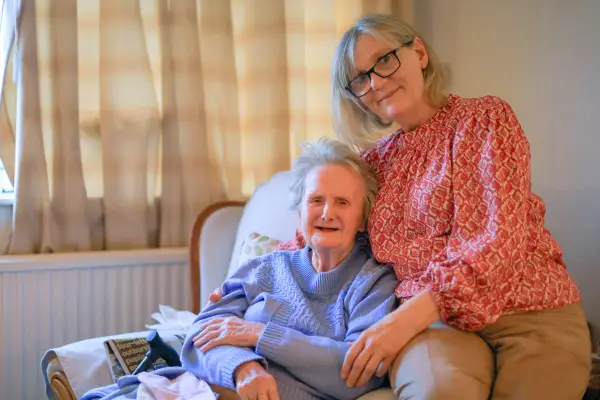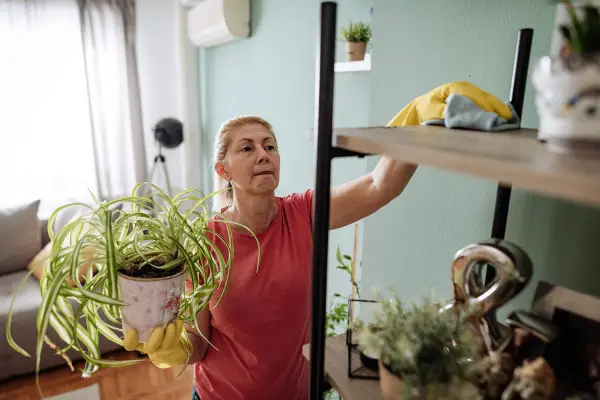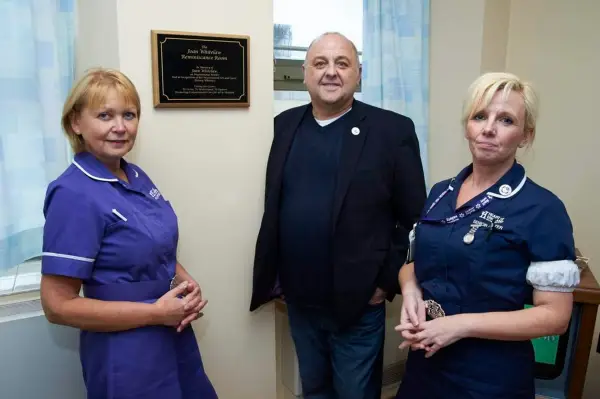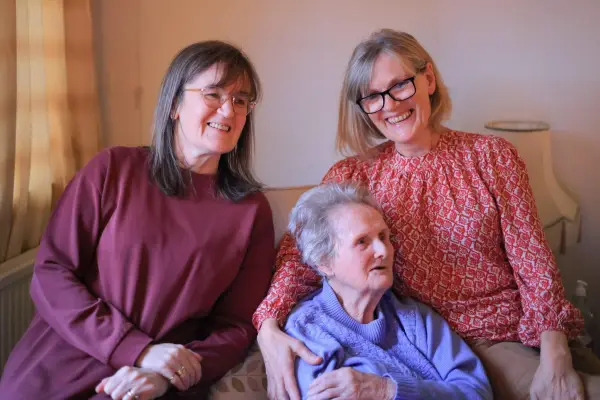How much does live-in care cost?
Discover how much live-in care costs so you can confidently choose the right support for your loved one.

6,000+ Carers
Select from over 6,000 qualified carers
Fast matching
Care can begin in as little as 24 hours
Across Great Britain
We have organised care in every GB postcode
Cost efficient
Costs on average 35% less than traditional services

How much is live-in care in the UK?
In the UK, live-in care typically costs between £1,200 and £1,500 per week. The exact amount your loved one might pay depends on several factors, including:
- Care complexity: More advanced needs such as dementia care, palliative care or mobility support often require specially trained carers, which can increase the weekly cost.
- Location: Costs can be higher in areas like London and the South East, and generally lower in the North of England, Wales or Scotland.
- Type of provider: Introductory agencies tend to be more affordable than fully managed care providers, but they may offer less hands-on support or oversight.
- Day-to-day requirements: If your loved one is a couple needing shared care, requires overnight support, or needs help with housekeeping or companionship, this can also affect the cost.
What's included in live-in care costs?
Live-in care costs typically include:

A dedicated carer living in your loved one’s home

Daily support with personal care, mobility, meals, medication, and companionship

Light household tasks such as laundry, cleaning, and shopping

Support during the night (intermittent assistance if needed)

Ongoing wellbeing checks and communication with the family

How much does Elder live-in care cost?
At Elder, our pricing is fully transparent:
- Starting from £1,150 per week for one person
- No surcharges for weekends or bank holidays
- No joining or registration fees
- No extra charges for carer changes or cover during breaks.
We tailor every care plan to the individual. This means you’ll only ever pay for the level of care you need, and nothing more. Contact our Care Advisors for a personalised quote.
Use your free MyElder account to build a care profile and understand your care needs in more detail before requesting a quote.

Live-in care vs care home costs: what’s more cost-effective?
When comparing live-in care with care home fees, many families are surprised to learn that live-in care is often just as cost-effective and sometimes more affordable.
The average weekly cost of a residential care home in the UK ranges from £1,300 to £2,500, depending on the location, type of care, and the room chosen. Homes in London and the South East typically cost more, and fees can increase further for specialist support such as dementia, nursing or palliative care.
By comparison, live-in care usually costs between £1,200 and £1,500 per week, offering one-to-one support in the comfort of your loved one’s own home. This fee goes entirely towards the personalised care your loved one receives, rather than accommodation, shared staffing, or extra services that may not be relevant, like group activities or hairdressing.
If care is needed for a couple, live-in care becomes significantly more cost-effective. While a care home would charge for two separate rooms, live-in care for couples involves only a small additional fee, making it a more affordable and personal solution for two people living at the same address.
How to choose the right live-in care agency for your loved one
Choosing a live-in care agency is a big decision – one that can directly impact your loved one’s comfort, independence, and quality of life. Understanding the different types of care providers and asking the right questions will help you find a service that meets both your care needs and budget.
Introductory agencies vs managed care providers
In the UK, there are two main types of live-in care agencies:
Introductory agencies
Introductory agencies, like Elder, connect families with self-employed professional carers. These agencies handle recruitment and vetting, but you remain in control of day-to-day care decisions.
This model offers:
- Greater choice and flexibility – You select the carer who best suits your loved one’s personality and routine.
- More personalised care – Carers work with you directly to adapt care to your specific needs.
- Lower costs – Introductory agencies are often more cost-effective, especially for couples.
Not all introductory services offer the same level of support. Some may step back after matching you with a carer, while others, like Elder, provide ongoing clinical and family support.
Managed care providers
Managed live-in care providers are regulated by the Care Quality Commission (CQC) and oversee the delivery and supervision of care. They usually employ carers directly and handle everything from care planning to staffing.
However, it often comes at a higher cost, and you may have less say in choosing your carer.
Key questions to ask when comparing live-in care agencies
Whether you’re speaking with an introductory service or a managed provider, ask the following to make sure the agency aligns with your needs:

Care and support questions
- What tasks do carers support with as standard (e.g. light cleaning, laundry, cooking)?
- What level of personal care is included (e.g. bathing, dressing, medication)?
- Do they support complex needs or offer 24-hour care?
- Do they support couples, and is there an extra charge?

Communication and continuity
- How are carer breaks covered – is there help sourcing a replacement?
- How do they keep families updated – is there a portal or regular communication system?

Cost-related questions
- Are there additional fees for weekends, holidays, or overnight care?
- Do they charge admin, joining, or cancellation fees?
- Is the weekly care rate fixed or personalised?
- What ongoing support is included in the cost?
What makes Elder different as an introductory agency
At Elder, we offer the flexibility and affordability of an introductory service, combined with the peace of mind that comes from ongoing support.
What funding options are available for live-in care?
There are several ways to help cover the cost of live-in care, depending on your loved one’s financial situation, health needs, and homeownership status. Below are the main options to consider:

Local authority funding
If your loved one has savings and assets worth less than £23,250, they may be eligible for financial support from their local council. The process includes:
- A care needs assessment to determine what type of care is required.
- A means test to review income and savings.
Important:
If your loved one is receiving care at home (rather than moving into a care home), the value of their home is usually not included in the means test. This makes live-in care more accessible for many families.
Attendance Allowance
This is a non-means-tested benefit available to people over State Pension age who need regular help due to illness or disability.
- You could receive up to £108.55 per week, depending on care needs.
- It can be claimed alongside other funding, such as local authority support.

NHS Continuing Healthcare (CHC)
If your loved one has significant and ongoing health needs, they might qualify for fully funded care through the NHS. This includes:
- A full assessment carried out by a multidisciplinary team.
- Coverage for all care costs if your loved one is found eligible.
Live-in care can be funded in full through CHC if it’s the most suitable option.

Equity Release
If your loved one owns their home, equity release could provide a way to unlock funds to pay for care without needing to sell the property.
However, this is a complex financial product, and it can affect inheritance or long-term financial planning. It’s essential to get independent financial advice before considering this route.
Final thoughts on the cost of live-in care
Live-in care costs can seem high at first glance, but when you break it down, it often provides greater value, flexibility, and emotional wellbeing than residential care. A transparent, well-matched care arrangement can lead to better outcomes, and peace of mind for everyone involved.
By understanding what affects pricing and knowing what funding help is available, you can make a more informed decision about whether live-in care is the right investment for your loved one’s future.
FAQs
Still have questions?
0333 920 3648Not necessarily. Live-in care often provides better value for money, especially for those with specific needs or for couples. Your loved one receives one-to-one support tailored to their needs, rather than sharing staff with other residents. Unlike care homes, you’re only paying for the care itself, not for accommodation or shared facilities. For couples, live-in care can be significantly more cost-effective.
In some cases, yes – through NHS Continuing Healthcare (CHC). This is a funding scheme for people with serious or complex medical needs, and it can cover the full cost of live-in care at home. If you’re eligible, the NHS will fund:
- A live-in carer to support with healthcare and personal care needs
- Help with daily tasks such as washing, dressing, and medication
- Any other care-related support needed to live safely at home.
To qualify, your loved one’s care needs must be primarily health-related – this is known as having a primary health need. They will start with an initial screening, which can be arranged by their GP, social worker or district nurse. If the checklist shows they may be eligible, they will move on to a full assessment.
If your loved one’s health is getting worse quickly, they may be eligible for a fast-track assessment for urgent support.
First and foremost, think about what’s most important to you, your loved one, and your family.
If you’d like more choice and control over who provides care and how, you may be better suited to an introductory service like Elder. These agencies work exclusively with self-employed carers, matching them to those needing care.
Introductory agencies manage carer recruitment and pay, but don’t have an on-going role in how care is delivered. This means you’ll be free to work directly with your carer to agree a daily routine that works best.
Not all introductory agencies are created equal though. Some only focus on recruiting carers – and class themselves as ‘recruitment agencies’. As such, they may not be able to offer much support once care begins, and may even leave finding respite care up to you to arrange when it’s time for your carer to take a break.
If you’re exploring live-in care options for a loved one, there are several trusted ways to get support:
- Read reviews on Trustpilot: Looking at verified reviews for live-in care agencies can give you valuable insights into real families’ experiences with different providers.
- Speak to an independent care advocate: Advocates are trained professionals who can guide you through the social care system and help you understand your rights.
- Talk to a Care Advisor: At Elder, we offer free, no-obligation calls with our expert Care Advisors. They’ll listen to your situation and help you explore the best live-in care options for your loved one.
These resources can help you make a confident, informed decision about live-in care.
Learn more about our services

Live-in care
Long-term 24-hour support
- A carer lives in the home to provide round-the-clock support
- Suitable for people living with conditions like dementia, reduced mobility, etc.
- For long-term care needs

Respite care
Temporary 24-hour support
- A carer moves in for a few days to provide round-the-clock support
- Suitable to cover for a main caregiver or for a temporary increase in care needs
- Minimum duration of 3 days

Visiting care
Flexible home visits
- Book as many hours as you need for help in the comfort of your home
- Support with everyday tasks like grooming, walks, cooking, etc.
- From as little as 1 hour per week





